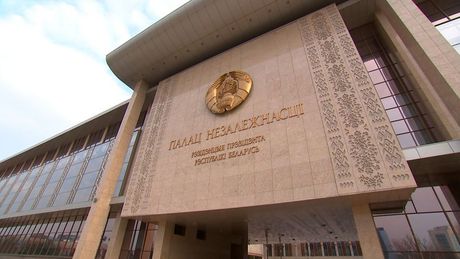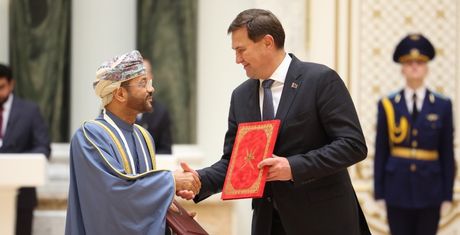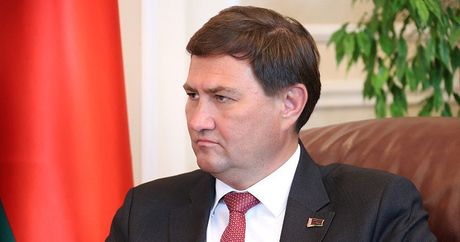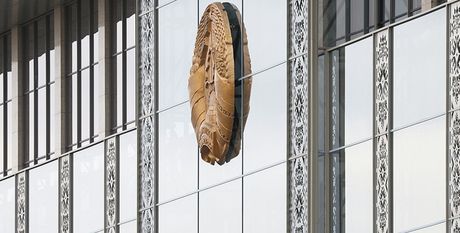Sneak peek at CIS informal summit in St. Petersburg
14:49, 26 December
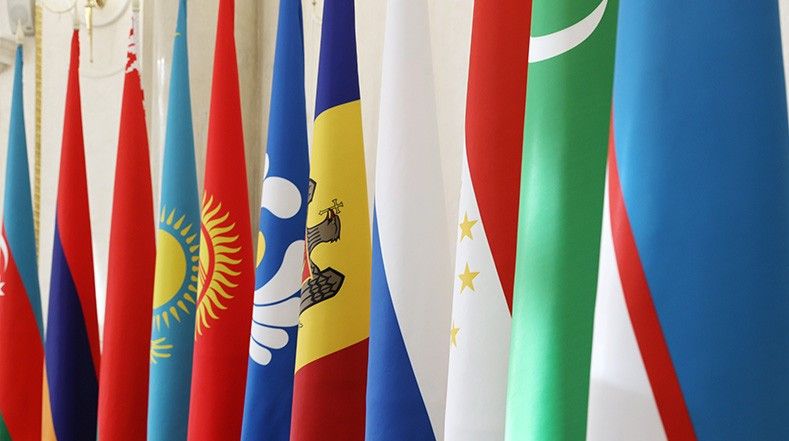
Photo: BelTA
Belarusian President Aleksandr Lukashenko arrived in St. Petersburg on 25 December to take part in the informal meeting of the CIS heads of state scheduled for 26-27 December, BelTA informs.
- Share on Facebook
- Share on VK
- Share on Twitter
The CIS leaders are expected to gather at the Boris Yeltsin Presidential Library in the afternoon of 26 December. The library is located in the center of St. Petersburg in the historical building of the Synod on Senate Square. The library building is often used for such meetings and summits.
Upon arrival the day before Aleksandr Lukashenko was greeted at the airport by two governors at once: Leningrad Oblast Governor Aleksandr Drozdenko and St. Petersburg Governor Aleksandr Beglov. The Belarusian head of state has already met with both of them this year. Belarus, Leningrad Oblast and St. Petersburg have a history of close cooperation in various fields, and this cooperation has got a boost in recent years. The agenda of the meeting includes large-scale projects to use the Russian port infrastructure for transshipment of Belarusian cargo.
The people of Belarus and Russia have a common historical memory. On 18 January, St. Petersburg and Leningrad Oblast will mark the 80th anniversary of the breaking of the Siege of Leningrad. The siege survivors living in Belarus will be invited to attend commemorative events.
What does the format of such informal summits imply?
Such meetings of heads of state in the run-up to New Year have already become a good tradition. Russian President Vladimir Putin invited his counterparts to meet in St. Petersburg at the end of the year as he attended the summit of the Eurasian Economic Union in Bishkek on 9 December.
As a rule, long policy speeches are not common for such meetings and media appearances are often limited to a protocol statement by the host of the summit. However, this format is valuable because it allows comparing notes in a calm, relaxed atmosphere and developing long-term approaches to resolving pending issues.
An exception in this regard was the pre-New Year informal summit on 28 December 2021, which was also held in St. Petersburg. Everyone was concerned about the pandemic, and therefore one of the topics was the joint response to the coronavirus infection. The head of the Russian Federal Service for Surveillance on Consumer Rights Protection and Human Wellbeing, the Chief State Sanitary Doctor of Russia Anna Popova was invited to speak on this issue at the summit. Then Aleksandr Lukashenko put forward a number of topical questions, the answers to which were very valuable both for the leaders of the countries and ordinary citizens of the CIS.
2022 summit agenda
The leaders of the CIS countries will sum up the results of the outgoing 2022 and discuss plans for further cooperation in the most relevant areas for the CIS.
As Chairman of the CIS Executive Committee Sergei Lebedev noted, the informal summit will give additional impetus to cooperation both within the framework of the CIS and the Union State of Belarus and Russia, TASS reported.
The Russian news agency Interfax clarifies that in addition to the multilateral format, the leaders in St. Petersburg will have an opportunity to discuss bilateral issues. For example, the summit will be attended by Azerbaijan President Ilham Aliyev and Armenia Prime Minister Nikol Pashinyan. Earlier, the Armenian side did not rule out that the two leaders would talk before the end of the year, although it did not specify the date or the place. At the same time, despite the possibility, no trilateral meeting of Putin, Aliyev and Pashinyan is planned on the sidelines of the summit.
"They [the president of Azerbaijan and the prime minister of Armenia] will be in attendance [in St. Petersburg], but a meeting of the three [with the participation of Russian President Vladimir Putin] is not planned," Russian president spokesman Dmitry Peskov told Interfax yesterday.
Common challenges for the CIS countries
The last time the leaders of the CIS countries met was in Astana on 14 October at a meeting of the CIS Heads of State Council. It was a full-format summit, which was chaired by Kazakhstan President Kassym-Jomart Tokayev.
The heads of state exchanged views on topical issues of the Commonwealth of Independent States. For example, Aleksandr Lukashenko made a number of important statements which were widely reported by the media. Considering that their relevance has increased more than two months on, let's recall what the Belarusian president talked about. Obviously, the problems he touched upon then will be on the agenda, one way or another, this time too.
“Unfortunately, what we had been talking about for so long, for so many years has materialized, it has become a reality. A real hybrid war has been unleashed against all of us. And Ukraine is just a pretext. Western countries have long been mulling over revenge for the campaigns they lost in the previous century, starting from the first days after the victory in the Great Patriotic War, and maybe even earlier,” the Belarusian leader said at the summit in Astana.
According to him, Russia and Belarus have found themselves in the crosshairs of economic and financial attacks. “However, I think that everyone here understands that the true objectives of Western strategists are much bigger - to divide the Eurasian space into sectors of influence and use our countries as raw material and industrial colonies. We need to be prepared for all kinds of provocations around the entire perimeter of the CIS. The recent events in Kazakhstan and Uzbekistan are striking and very illustrative examples. But this is just the beginning. Everyone will be put to the test,” Aleksandr Lukashenko emphasized.
The Belarusian president pointed to the lack of mutual support in the CIS in some instances and drew attention to the fact that principled positions of some countries still hinder effective joint response to the Western sanctions.
Aleksandr Lukashenko also noted that many interethnic and territorial disputes remain unresolved in the post-Soviet space. Today, external players are making incredible efforts to turn every, even the most insignificant, dispute into a heated confrontation.
“The economic situation is complicated. Ill-conceived actions of individual governments, primarily in the West, have caused significant damage to the global economy. By the example of Belarus and Russia, you have seen how fast traditional sales markets can close for our products and critical imports become unavailable, how fast the established forms of interstate settlements, investment, and much more can become unaccessible,” the Belarusian leader said. “Yet, we have everything in place to minimize the impact of global upheavals and unfriendly moves of aggressively minded states. We just need to skillfully use these opportunities.”
Let us hope that the messages of the Belarusian leader were heard and taken into account and the current summit, even if informal, will be an occasion to make a confident step into the future together. After all, it is not the formats of the meetings that matter, but their results.



